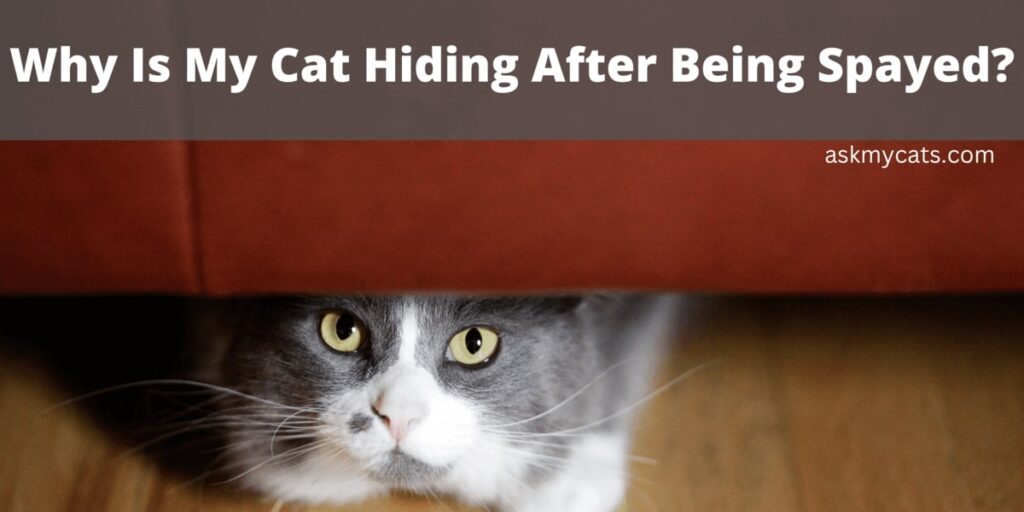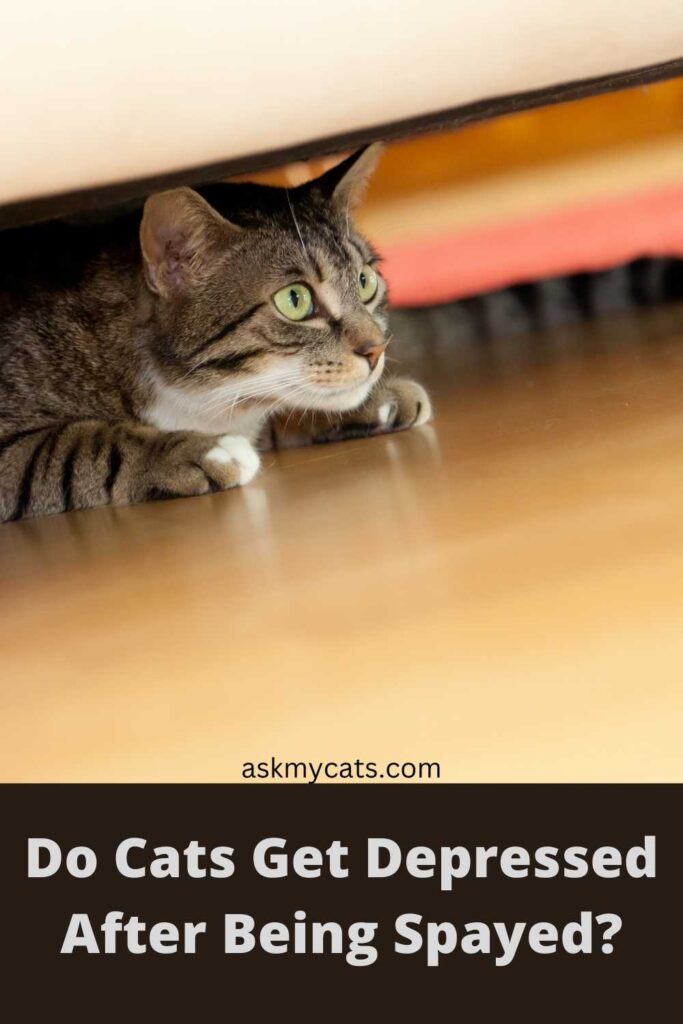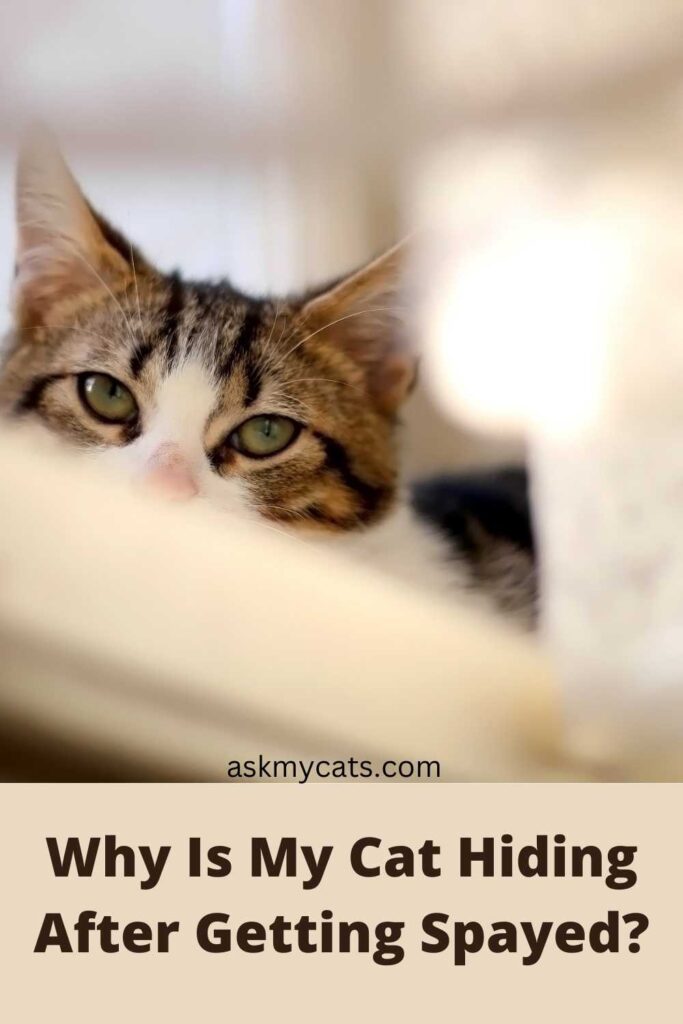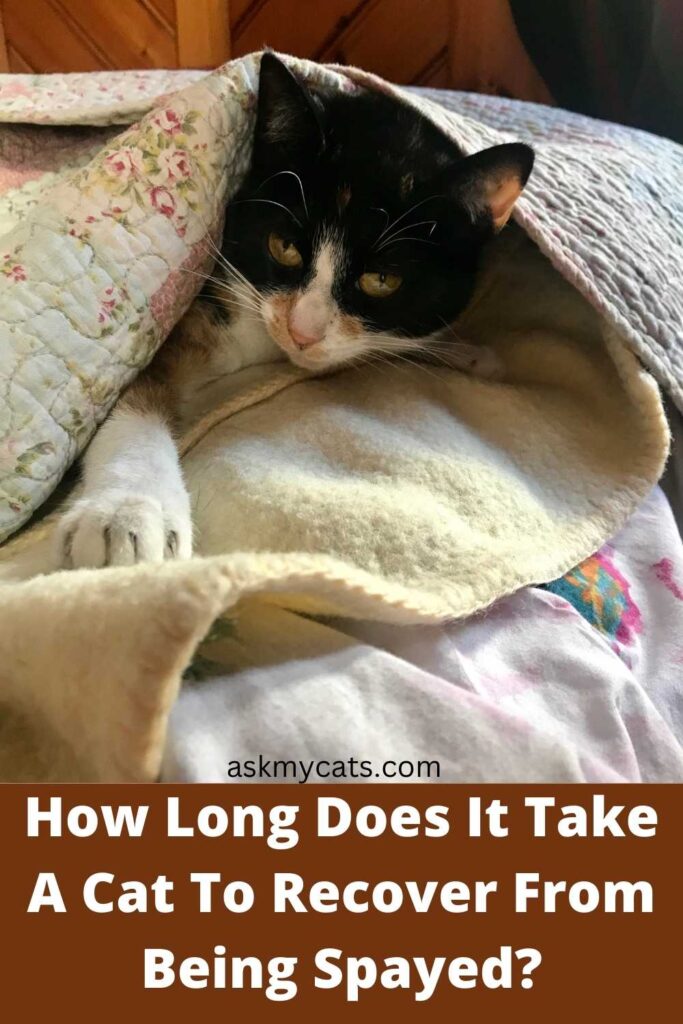It is commendable that you got your cat spayed. This saved you from a lot of trouble that could have arisen. Spaying also ensures that your cat will have a longer and healthier lifespan.
But did you notice any subtle changes in her-such as hiding and being timid? You must be concerned because of this since you have no idea why she is behaving like that.
In this article, we’ll talk about if it is normal for a cat to hide after surgery and discuss methods to help her recover faster.
Check it out.


Give Your Cat the Perfect Day
Get the Free Ebook!
Is It Normal For A Cat To Hide After Being Spayed?
No, it is not normal for your cat to hide after she is spayed because hiding is a hint to let you know that something is wrong with her.
Anesthesia effects may last after the surgery, and as a result, she may feel lazy or lethargic and would want to avoid any distractions. This can trigger him into going into hiding.
Expect to witness a cat coming out of anesthesia that is sleepy and possibly a little confused. Some felines become more aggressive when they’re hurt and feel exposed. Therefore, it is advised that you give her a cozy place to recuperate.
Make sure she has easy access to a litter box, water, and food. Your veterinarian will recommend the quantity, which is often half of her usual dish. For the first several days, handle your cat gently as she may be tender around the incision.
While your cat is healing from the procedure, you might anticipate some strange behavior from her, but specialists guarantee that her nature will not change.
Many cats may find going to the vet and having surgery to be terrifying and distressing. So a few days later, your cat may exhibit shy or repulsive behavior.
You can encourage her by giving her soft pet attention and providing a warm, quiet place for recuperation because this transformation is just temporary.
Behavior changes that occur right away after a spay are primarily a result of the procedure itself.
For a day or two, they might feel tender, be a little less active, and have a little less hunger, but after two to three days, the cat should return to normal.
Statistics do not support a change in behavior brought on by surgery. The major behavioral alteration is the absence of heat cycles in female cats.
Interesting Read: How Long Should I Confine My Cat In An Enclosed Area After Spay?
Do Cats Get Depressed After Being Spayed?

According to studies, removing a female cat’s ovaries for medical reasons increases the likelihood that she will experience anxiety and despair.
Mood swings can be brought on by the slow decline in hormone levels that occurs with age, but it seems that switching from youthful levels to neuter levels overnight is far worse.
But this only lasts a short while, and things quickly return to normal.
Anxiety Type Behavior In Cats
Finding effective treatments for a cat with anxiety is crucial since it can be just as upsetting and crippling for a cat as it is for a human to have anxiety.
It is the intense sensation of anxiety that typically surrounds a forthcoming event. The same kinds of discomfort and trepidation can also be felt by cats.
When a cat senses danger or threat, it experiences cat anxiety, which can lead to odd behavior.
- Activity Level: It may indicate worry if your cat stops engaging in the things they once found enjoyable. Consider the situation where your cat generally enjoys playing when you get home from work but all of a sudden decides she doesn’t want to. Keep track of these actions to observe whether they change.
- Mood Changes: Your cat may be experiencing anxiety if they suddenly become more frightened, antisocial, or violent. For example, if your cat is generally really affectionate and gregarious around you and then all of a sudden jumps every time you come around, it probably suggests they’re feeling unhappy about something.
- Avoiding The Litter Box: A litter box is intended for urination. If a potty-trained cat avoids using the litter box, it may indicate that something is wrong because they are aware that it is the only place they should urinate.
Your cat may be attempting to communicate their anxiety to you if they skip using the litter box and begin to urinate nearby or in other locations in your home, even on your bed.
Find out the reasons for Cat Lathergic After Spay
Why Is My Cat Hiding After Getting Spayed?

After surgery, cats frequently seek refuge in their litter box (or another location) due to pain and suffering.
To verify that your cat is not in discomfort, call your veterinarian to discuss the painkillers and any modifications that should be made to the pain-management strategy.
Make sure you are adhering to all the guidelines for limiting your cat’s activities. This can entail refraining from jumping, running, roughhousing with other pets, or taking part in strenuous activities.
Many cats experience stress after surgery, which may lead them to sleep in their litter boxes.
You can try following these tips to reduce your cat’s panic and stress:
- Make a secure space that is devoid of other animals, outside disturbances, and loud noises. Pick a location where your cat spends the majority of its time because it will have cozy furnishings and scents that they are accustomed to.
- In the same spot, put a low-entry litter box.
- Provide a box or a protected area for your cat to sleep in.
- Use Feliway Classic or other pheromone therapies to diffuse into a room or spray into it to help reduce tension and anxiety.
- Reduce outside noise by playing white noise or classical music.
- Make sure your cat has access to its own food and water.
Must Read: How To Tell If My Cat Is In Pain After Spay?
How Long Does It Take A Cat To Recover From Being Spayed?

Most skin incisions made during a spay procedure heal completely in 10 to 14 days, during which time any necessary removal of staples or stitches will also take place.
Post-operative Care
1. Keep an eye out for any signs of swelling, discharge, bleeding, or other issues in your pet’s spay incision area every day. Make sure to get in touch with your veterinarian if you notice any alarming symptoms.
Once the sutures or staples have been taken out and you have received permission from your vet to bathe or let your pet swim, do so.
2. In order to stop your pet from licking, gnawing, or scratching their surgical area, Elizabethan collars, also known as E-collars, are crucial. If your veterinarian advises using a cone after surgery, make sure to follow their instructions to prevent any potential major issues.
3. Following spay and neuter procedures, significant activity restrictions are required. Running, jumping, and playing can cause stitches to fail, to bleed, to hurt, and cause other post-surgical issues.
4. Since your pet was under anesthesia, you should limit their access to food and water when you get home and during the evening after their treatment.
You may normally start by giving them a tiny bit of water after a few hours, then give them a small portion of their regular food an hour or two later.
This makes sure that after anesthesia and surgery, your pet may drink and eat normally and is less likely to vomit, develop aspiration pneumonia, or experience other issues.
Interesting Read: Why Do Cats Not Use Litter Boxes After Being Spayed?
Frequently Asked Questions
Why is my cat distant after being spayed?
Your cat could appear more reserved after the procedure, but that’s only because her hormones aren’t fluctuating as much as they were when she was in heat.
Cats can be very friendly and loud during a heat cycle, which is eliminated by spaying. Because she won’t have these cycles anymore, your cat may appear a little calmer after having been spayed.
Because she won’t be engaging in those mate-seeking behaviors, your cat might seem a touch slothful, but it’s ultimately your responsibility to make sure she gets enough exercise and maintains her physical fitness. Having yearly checkups with your vet will help you keep tabs on your cat’s weight, dietary needs, and general health.
Final Words
Your cat’s breathing can be impacted by stress and anxiety, but your veterinarian should always test out any underlying medical concerns first. Then worry and anxiety should be taken into account, and this is one of the reasons why she first wanted to hide.
To ease her discomfort throughout the healing process, think about employing a pheromone diffuser. Your cat’s stress levels can also be reduced by creating a secure area that is enclosed and dark.
To ensure that your cat has a comfortable spot to relax while recovering, create a space where other cats and animals cannot enter.
That’s all you had to know about spayed cats and their post-operative behavior. Let us know in the comments section if your cat behaved in such a way and what you did to pacify her.
